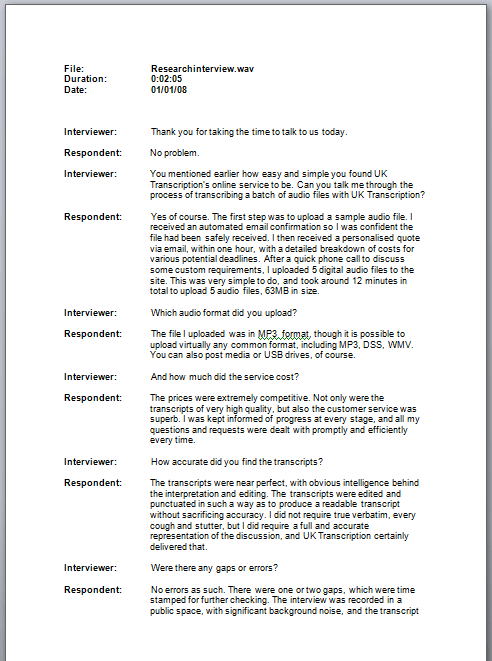My group met a couple times before we had to give our presentation. Our presentation was on Werner Herzog. When we did do the presentation I think we did well but we don't get our marks back for about 2 weeks. So we'll see then.
Our workshop was on transcripts and paper editing. I knew about transcripts as I was going to work for a transcript job but I didn't know what was paper editing. I could take a guess from the name but I didn't know fully.
Peter talked us through what a transcript was. It's basically a written down version of your interview with time codes included so that it makes for easier editing. Peter told us it could save us hours when editing. I don't really see the point as I think the effort you put into writing up the transcript, you could put it into editing. But I'd like to try it and see if it works.
Transcript example
Peter continued on about editing with paper. This is where you write your clips down on paper, typically sticky notes as it makes it a little bit easier, and arrange them as if you would arrange your clips on a video editing software timeline.
Example of paper editing
He also taught us to shoot with the edit in mind, so shoot how you want to edit it. And always capture ambient sound. This is to capture the sounds of the place where you're filming.
We were taught briefly about editing, but we have an editing workshop next week so we'll learn more. But we have been told to:
- Build up your timeline
- Start with rough interview edits
- Work to a rough timing
- Cut it down - take out the pauses and repeats. Which means no umm's or err's
- Select cutaways to cover cracks but not wallpaper it
- Piece of imagery must be integral to narrative i.e. don't have a dentist talking and cutaway to a piercing studio
- Work on an opening/ending that has impact
My group are going to meet today so we can plan what we're doing and hopefully shoot soon


No comments:
Post a Comment